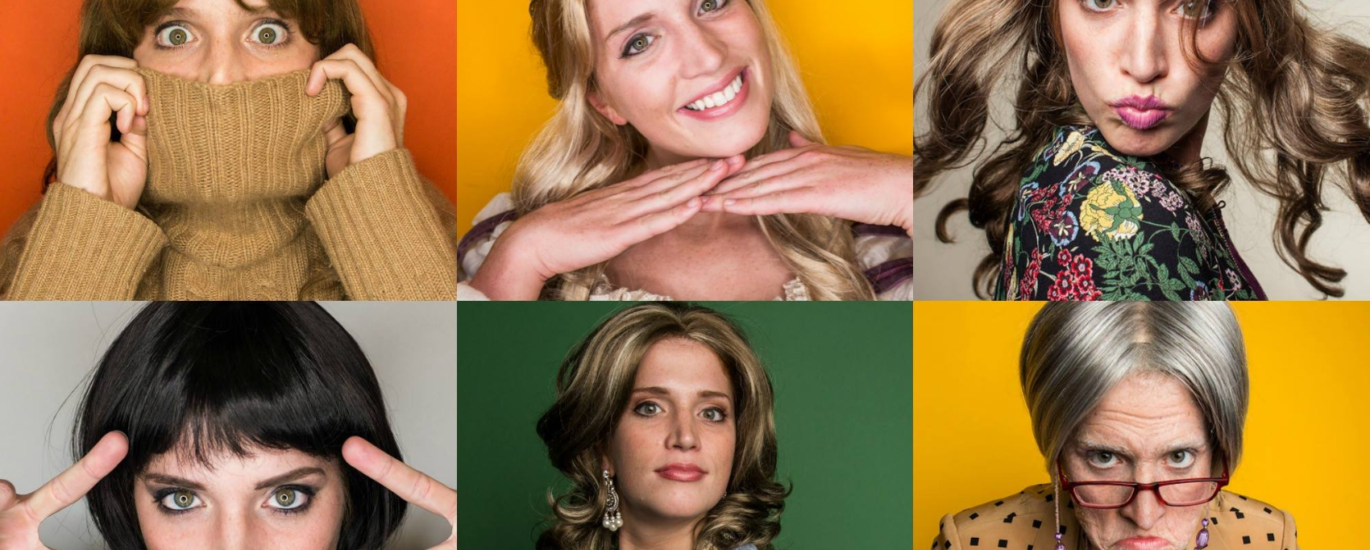“My father taught me all the male arts of fighting, negotiating, and expecting others to adjust to my comfort level”
Amy is joined by comedian Natalie Madsen to discuss her career as a woman in comedy, following her from her first stand-up set to the release of her new movie, Go West, exploring gender dynamics and the changing political landscape along the way.
Our Guest
Natalie Madsen

Natalie Madsen is an actor, writer, producer, and director. She is best known for her eight years on the sketch comedy show Studio C, where she was an original cast member and writer. She has since co-founded JK! Studios, a creative house and production company that produces TV shows, web series, and feature films. She has three children, one husband, and a slightly concerning caffeine addiction.
The Discussion
Amy Allebest: Who are your favorite comedians? Spend just a minute in gratitude for the joy that they brought into your life, and then allow me to start today’s episode with some quotes from some of my favorite comedians. From Mindy Kaling: “I say, if you love something, set it in a small cage and pester and smother it with love until it either loves you back or dies.” From Amy Poehler: “Fighting aging is like the war on drugs; it’s expensive, does more harm than good, and has been proven to never end.” And from Tina Fey, and this is part of a prayer for her daughter: “Lord, lead her away from acting, but not all the way to finance. Something where she can make her own hours, but still feel intellectually fulfilled and get outside sometimes. And not have to wear high heels. What would that be, Lord? Architecture, midwifery, golf course design? I’m asking you because if I knew, I’d be doing it.”
You may have noticed that all my favorite comedians are women. I was lucky enough to grow up in a world where pioneers like Lucille Ball and later Carol Burnett had paved the way for Julia Louis-Dreyfus and later, my favorites, Tina Fey and Amy Poehler. And if you ask my kids and their friends who were some of their most influential comedians as they were growing up, they would, without a doubt, say the original cast of Studio C. So I am so excited to welcome to the podcast today the one and only, Natalie Madsen. Welcome, Natalie!
Natalie Madsen: Hey, thanks for having me! I’m excited to be here.
AA: I’m so excited to have this conversation. First, we’ll start off with your professional bio and then I’ll ask you some questions about your personal life. And we can get into that later, but I’ll just read your official bio first.
NM: Great.
AA: Natalie Madsen is an actor, writer, producer, and director. She is best known for her eight years on the sketch comedy show Studio C, where she was an original cast member and writer. She has since co-founded JK! Studios, a creative house and production company that produces TV shows, web series, and feature films. She has three children, one husband, and a slightly concerning caffeine addiction. There you are! Well, let’s jump in. Tell us about where you’re from, a little bit about your family of origin, and some of the things that have brought you to the place you are today.
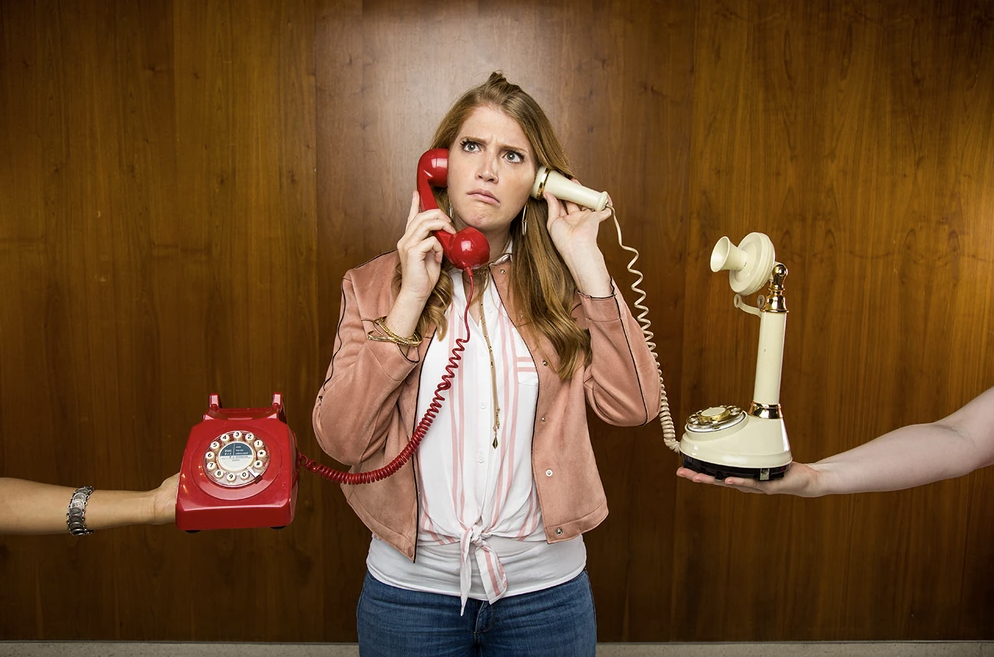
NM: So, I was technically born in Atlanta. I moved around a little bit as a kid, but my family settled in Minnesota when I was in fifth grade, so that’s where I call home. Kind of in the middle of nowhere, but a really, really great place to grow up. I have four sisters and one brother, so a lot of feminine energy in my life from the very beginning, which was great.
AA: Love it.
NM: I love having so many sisters. It’s wonderful. So, we were always kind of this group of ladies. We would take over any place we went, having loud and fun personalities, and my parents as well. I had a really, really great childhood growing up. And I think I’ve shared the story before, but I’ve been asked before, “Why do you think you were so interested in comedy? How did you get into comedy?” And I always kind of half-joke that my whole life I’ve been trying to make my dad laugh. And it’s not because he’s withholding, he has a great sense of humor. But he’s also not a pity laugher, if that makes sense.
AA: You have to earn it?
NM: Yes. And when it’s a really good joke, he has an amazing laugh. It’s just a great laugh, so I always wanted to make my dad really laugh. Anyway, growing up, I did theater. I got involved in a lot of community stuff like that. I did community theater, school theater. I was always really interested in English and literature, and that’s kind of what I thought I would do. I thought I’d be an English teacher and then maybe direct some plays. So my senior year, I did my first play that was a comedy, and that was really fun. I just had a great time doing it. That was my favorite one. So I kind of got into comedy, like this is a good time, but I never really thought much of it. And then I came out to Utah for school, I went to BYU, and it was one of those things. I had just moved there, freshly 18, I’m on my own for the first time. My older sister was there as well. And it was my first Friday night, I had just moved into the dorms, just a little baby, and my sister was like, “Hey, there are auditions for this group called Divine Comedy. You should go audition.” And I had no idea what it was. I didn’t know what sketch comedy was, I didn’t know anything. It was mainly like, “That sounds like a fun thing to do on a Friday night, there’s nothing else going on,” right? And all the flyer said was, “Just come and you have two minutes to make us laugh.” So we walked over there and in my mind I put together what I was going to say for two minutes.
AA: Just completely spontaneously with no preparation except on the walk over?
NM: It was pretty darn spontaneous. I kind of made up a lot of it. But it was one of those things, and I love talking about this with other people, because you just don’t know what moment will lead you to something else. And most of those moments start with this feeling of like, “That sounds fun” or “That sounds cool. I want to do it for no reason other than that it feels exciting, so I’ll do it.” Right? I’m not overthinking it. I feel like that happens a lot in your life to lead you in the right direction. That was for sure one of mine. So anyway, I auditioned and got in and did sketch comedy for four years. Because again, I was a week into college, like freshman-freshman. So I did it my whole college degree. I ended up getting a degree in theater education, but really my degree was in Divine Comedy. My degree was in sketch comedy. I did that for four years and it was such a great experience. The original cast of Studio C, we all met there. And basically, while we were in school, every month we would write, rehearse, produce, advertise a show every month.
AA: Wow.
NM: And that’s where we learned everything. We would put together scripts, we would test them, they would bomb, we would adjust, rinse and repeat over and over and over again for four years. And that’s where we really got bonded and we really figured out our comedic sense. So by the time the opportunity for Studio C came around, we had been working together for years and we’d been honing the skill of sketch comedy and we were very ready for it. But most people, when they joined Divine Comedy, it was like, “This is so fun, wouldn’t this be cool to be paid for it? But oh well, I’m going to go be a doctor now.” That’s what it was. And Divine Comedy is still on campus, I believe. So it existed years before me and it kept going. It was just a fun extracurricular thing to do, you know? And the fact that it turned into something else is really crazy.
I want to do it for no reason other than that it feels exciting
AA: Okay, I have a question. Do you think that had you known more about the audition for Divine Comedy, would you have been a little more intimidated?
NM: Yeah.
AA: Okay, so it was just spur of the moment, right?
NM: I don’t even know. I still would have done it. I probably would’ve been a little bit more nervous or I would’ve been a little bit more rehearsed. I would’ve understood what this was, but again, it was literally like, “This sounds like a fun thing to do. I’ve got nothing else going on.” It was almost like a dare, like, “Hey Nat, you should go do that.” And I was like, “Yeah, all right.”
AA: I love that.
NM: The blind optimism of an 18 year-old. “What’s the worst that can happen? I won’t get it, big deal.” It was kind of that energy, which I think was great.
AA: So great. Okay, what happened next? Did BYUtv come to you and say, “Hey, we’re going to start a show,” or how did that evolve?
NM: Really the story of Studio C actually starts back in 2008, and we decided, “Hey, we should put together this proposal for BYUtv.” And we basically just called it Divine Comedy TV. We were getting to a place where, again, we hustled and hustled every month, and my first year it was really hard to get people to buy tickets but by my third year, we were selling out. There was this momentum going. And we were like, “Hey, I think people kind of like watching our stuff.” So we put together this proposal to BYU Broadcasting, and they very kindly said, “We don’t do this kind of stuff. Thanks, no thanks.” And we were like, “Okay, that’s what we figured, but we just wanted to try.” So that was kind of that.
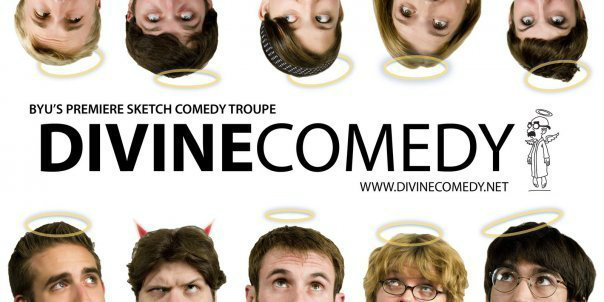
And then I graduated from BYU in 2011, and during that first fall I was working as a theater teacher. And BYU Broadcasting got a new director of content, and he came to a show. And he said, “Okay, we’ll film a test pilot. That’s all, though.” Like, “Okay, we’ll film something.” You know what I mean? So they said, “Hey, Nat, would you come back and film this test?” I said, sure, and then from what I heard, they pitched that test internally and the powers that be that made the decisions, I guess they watched that test pilot and they said, “I don’t really get it, but I think my grandkids will like it.”
AA: Haha, that’s great.
NM: So they said, “Yeah, go ahead and make a first season.” And that’s kind of how it happened. And I always like to say, because it’s true, I paid my babysitter more than I made in the first season.
AA: Oh no!
NM: It was one of those, like, “I just love this and I want to do it.” And we filmed the test when I think I was 10 weeks pregnant with my oldest. So by the time they were like, “Okay, we’re going to film a season,” I was having him. And we started rehearsing and filming season one when I was two weeks postpartum.
AA: Oh my goodness.
NM: And it was awful, I don’t think that’s even legal anymore. At least I hope it’s not. But it was also one of those things where I felt and I knew that if I don’t jump in now, the ship’s going off without me. So we kind of figured it out. And I still think back on that time, and I don’t know how I did it. I feel tired just thinking about it, but that’s kind of how it was. And nobody else had kids, even the people directing the show, I was the only one with a baby. And it’s been funny that as the years have gone by, when we were filming the show and other cast members would start having kids, they’d say, “Natalie, I can’t believe you did that. I’m so sorry.” You know what I mean? Now I understand how crazy it was. It was really, really crazy. We filmed that first season and then that second season, and throughout the first three seasons we all had day jobs. And they said, literally, “Don’t quit your day job, this probably isn’t going to work out.” Like James was an engineer, we all had jobs during the day, and then at night we got together and rehearsed and filmed. So that’s how it was for the first couple of years until things took off from there.
AA: So I’m wondering, I’m a little bit older than you but in the same faith tradition and went to BYU also, and I know that for me I was very, very discouraged from working outside the home once I had kids. Did you have any inner conflict about that? And did you get flack from people about, like, “Whoa, you’re having a baby, you should be prioritizing your family”?
NM: It’s interesting because I never thought that a kid would slow me down.
AA: Wow.
NM: I never thought that having a baby would impede things. I always just thought about it as like, “My husband and I want to grow our family, and we’re very much a tag team effort.” There have been times in our marriage where he has been a full-time stay-at-home dad and I’ve been full-time working and vice versa. So I’m really lucky in that regard. But at least when I first had my son Jack, in my immediate circle, like the cast, no one was ever like, “Well, you’re going to stop, right?” Because we were just getting going. So I never really got that. But I do remember that we had an interview with a journalist for some news outlet, and I remember that she asked me, “How do you reconcile in your heart to work outside the home?” That was the question. And it kind of threw me off and I was thinking, “I can’t believe you just asked such a blatant question.” I remember looking around the room and the rest of my castmates were also like, “Um, that’s crazy.” And I think by that time some of the men in the group had had kids. So I said something like, “Well, you know, I’m a parent, Jason’s a parent, Jeremy’s a parent, and we figure it out with our partners and it’s great. I’m grateful that I get to have both sides of my life.” I think I said something like that.
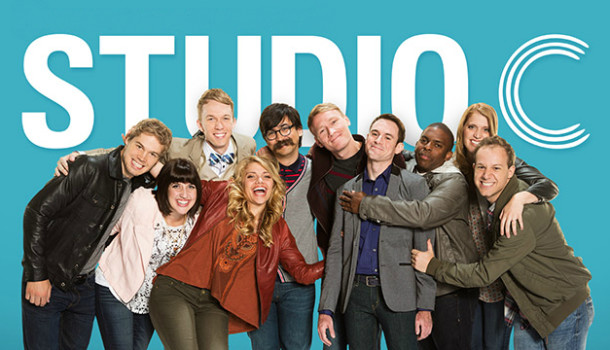
That was probably one of the first, like, “Uh, why are you asking me? I feel very peaceful about this.” Because I felt called to do it. There have been a lot of little moments like that, especially as a woman. I’ve seen that change a lot over the last ten years, I will say. I feel like ten years ago, not as many moms were working and now a lot of moms work because there are a lot of options. I’m hoping that by the time my daughters are in a position where they decide if they want to have kids or not, I’m hoping it’s even more like, “Yeah, you can have kids and keep going in a career and it’s doable.” You know what I mean?
AA: Oh, yeah. I’m actually really encouraged to hear the difference from me to you. Because it’s not long from me to you, but that’s really different from the environment that I experienced and I really, really internalized it. I mean, it also depends on your particular home that you grow up in, and your particular church leaders that may have really strong feelings one way or the other. People can absorb all kinds of messages, but I’m so happy to hear that you had that inner voice and you’re like, “I’m doing this.”
NM: I think it was kind of that. Even going to school, I never thought I was going to be a writer and an actor. That was just not really the idea. And then even while getting my degree, I do remember thinking, “I’ll teach for a few years and if I love it, I’ll keep teaching after kids. I’ll let myself choose once I have kids. I don’t know how I’ll feel.” You know what I mean? I do remember thinking that maybe I wouldn’t work, maybe I would be home. But I always felt like it would be an open question, that I could always be receptive to the answer. But because of this particular job, it was a cast of 10 people and they’ve been selected, so it’s not like you can interview someone to replace my spot. And we were such a team and we’d worked together for four years. So to not be a part of the team, I don’t think it really crossed my mind, to be honest.
AA: Well, I was going to say, too, I think that’s so great for you. And then what I just realized, because you were talking about the BYUtv execs who were like, “We don’t really get it, but our grandchildren might get it.” So these are all grandpas, I’m guessing. And how great for them, because what I’m realizing is that we don’t even know how it may have helped them to open their minds to see you do it. Like, you had your experience, but you’re influencing the powers that be at a very conservative institution that’s primarily male leadership. And to have that kind of attitude of joyfully doing both, I’m sure that impacted a lot of people, maybe more than you even know.
NM: I hope it did. And I remember, like I mentioned, I was the first one in our bubble of Studio C to have a child. And being the mom of that child, there were physical things that I needed to do. I needed to pump. I had all three of my kids on the show, and I will say that my postpartum experience was very different from my first child to my third. So my first child, to your point, I don’t know if they had a lot of new moms in the building.
AA: Oh, for sure not, right?
NM: And you add this layer of the film industry, and the work days of a film shoot is not great. I mean, a good day is 12 hours long. You have to be on call constantly. I can’t tell you how many times I got mastitis because I couldn’t pump because they needed me for a shoot. Things like that, or there wasn’t a room to do it in. It would be in supply closets or bathroom stalls or in my car in the middle of the woods in the middle of the night, because that’s where we were filming. I always used to joke that if I ever were going to write a memoir, it would be called “Oh, The Places I’ve Pumped” or “The Costumes I’ve Pumped In” with the wigs on my head while pumping.
AA: Oh my goodness.
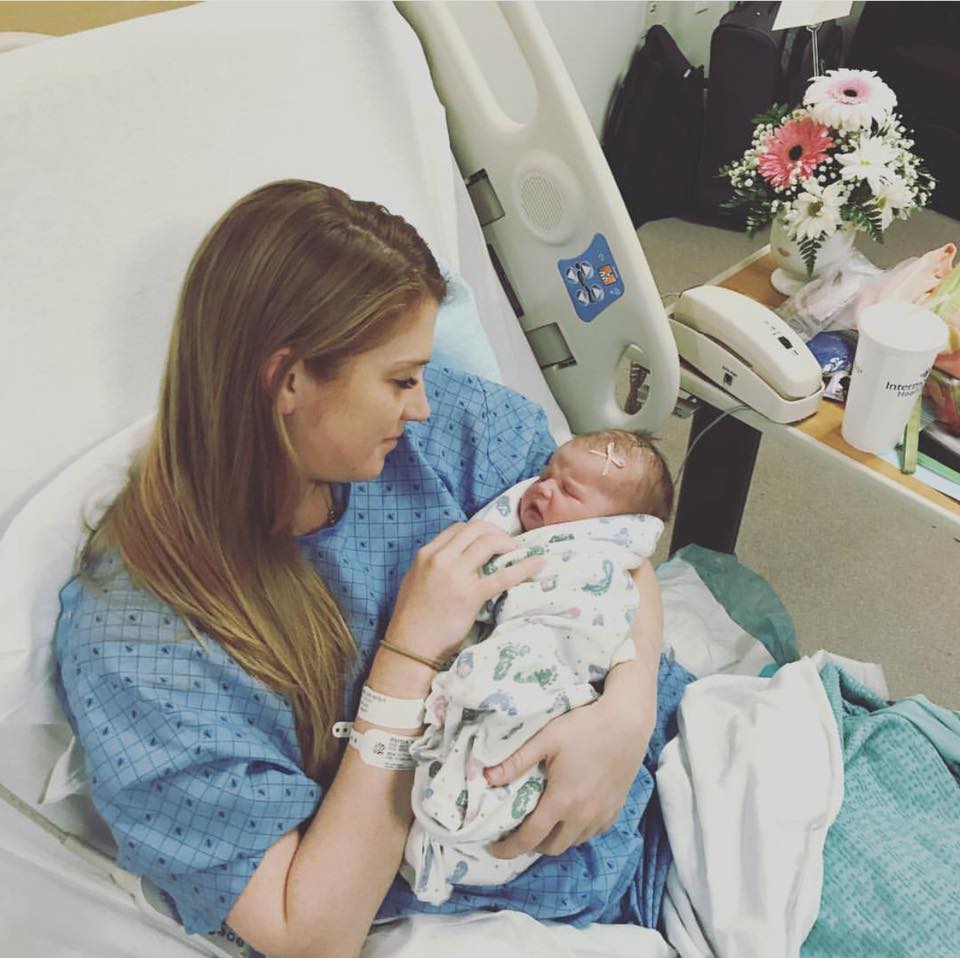
NM: Because again, I had all three of my kids on the show. So, with my first kid, it was really hard and I was also learning because I was so young. I was learning how to ask for that, right? “Hey, I need to pump. Can I take a break?” When you’re in this big machine of a film day where there are fifty crew members and they’re all waiting on you, to say, “Can I have a 10-minute break and shut everything down?” is really hard to do. But by the time it was my third, I think the system had learned a little bit more how to be more friendly to that. But I genuinely think that, to your point, I don’t know if they had ever worked with a nursing mother before. I don’t know if they had, at least not as an actor and a writer and a creative like that. I don’t think they had.
AA: That is so awesome. That’s really, really inspiring to think of that. The thing that I sometimes will say to men, and I’m not saying that anyone in your situation did, but if men do sometimes say like, “What a pain” or “It’s kind of an inconvenience,” it’s bringing it home to be like, “You will never find yourself in the position of pumping for a baby, but you’ve all been babies.” You have all been babies. And we like to think of these issues as “women’s issues” or “mothers’ issues”. How else do people come into the world, right? We all have to be able to accommodate that process. That’s awesome, Natalie.
NM: It’s really true, and it makes me so happy how much better maternity and paternity is. We still have a long way to go, I think, but when I was having kids it was basically just like, “Hey, you can take up to six weeks and you won’t get fired, and that’s all.” You weren’t paid, you weren’t supported through that time, and now it’s a little different. So, anyway, that’s a different time.
AA: Yep. Moving forward, slowly but surely. Okay, you brought up SAG, you brought up the film industry, and I’d love for you to talk a little bit about the comedy field in general. Because I know that’s also been making progress, but that has not historically been a particularly hospitable place for women.
NM: It hasn’t. But I’ve been so lucky to grow up in the time that I have. I did grow up with Amy Poehler and Tina Fey on Weekend Update every Saturday night, so I saw it happening. And I do think that in general, there’s been such a shift the last few years of acknowledging that women’s stories are interesting. It’s not like, let’s make a chick-flick rom-com, that’s what the girls love, and comedy is like a bros club and it’s all crass, it’s all fart jokes, right? That’s just not really it anymore, and I really love it. I think in general, the shift is because more and more of the people in the room that make decisions, they’ve been exposed to more women working in general. And they realize, “Oh, women are people.” One of my favorite sweatshirts that I have is from The Bad Broadcast and it says, “Funny for a girl”. She’s my cousin, shout out to her. It’s one of my favorite sweatshirts because I do feel that for so long it was like, “Man, you’re funny for a girl.” I would be told that, and like, what are you talking about? I’m just funny because I’m a human being. Of course, women can be funny because people are funny. Life is funny. So I’ve really, really loved that shift.
I love that this whole year has been one for the girls. I love it. The Barbie movie this summer, I loved, loved Barbie. I could talk about it forever. But the best part about Greta Gerwig, she’s my favorite director right now because every story she tells is just an interesting story. It’s about a real person and all the main people happen to be women and they’re all so different from each other. They’re all so honest and I think it’s just a really good case study that we don’t need to flag something as like a female movie or a female comedian. It’s just like, that’s a comedian and she’s great. This is a great movie, it’s a great story. You know what I mean? I feel that shift a lot and it’s encouraging.
comedy is like a bros club and it’s all crass, it’s all fart jokes, right? That’s just not really it anymore
AA: Totally. It’s encouraging, for sure. One thing that you and I talked about before, and you just brought up Tina Fey and Amy Poehler, who I think really did help things change so much. You had brought up this story that I remember from, I think it was from Amy Poehler’s book, there’s this moment in the writing room. Can you tell that story?
NM: Yes. I really read Amy Poehler’s book once a year. It’s my favorite. It’s such a fun read, I can’t recommend it enough. It’s called Yes, Please. And it’s called Yes, Please because she primarily trained in improv comedy, and the classic rule of improv is you say “yes, and-”. And so her book is called Yes, Please because she always tries to have a kind and optimistic outlook as she does her comedy. Anyway, I love it. There’s this great story, and I’ll paraphrase it, but Amy Poehler was in the writer’s room at SNL and everyone was joking around and she did some sort of like, I don’t even know if it specifies it in the book, but some sort of un-ladylike either word or gesture, and people were laughing, and Jimmy Fallon said, “Ew, I don’t like that, it’s weird that you’re doing that.” And she just kind of looked at him and said, “I don’t care if you like it” very seriously. And then she just kept goofing around.
She’s always had that inherent self compass in her mind, that it doesn’t really matter what people think. Am I having fun, or am I using this talent that I have? And who cares what people think? I like that story for a few reasons, but especially because that’s how it’s been in comedy for women for so long. Like, “Oh, that’s too far. You’ve crossed the line because you’re a girl.” All of a sudden it’s not funny anymore. And it doesn’t really matter. It wasn’t for Jimmy, right? We’re not catering to a male gaze on our comedy, we were just trying to say what we think is funny. I love that. It’s such a good example.
AA: That’s a good example. And because they were friends and I believe they’re still friends, I know that for me sometimes it’s harder. I know that sometimes my internalized patriarchy, I notice myself having a disproportionate need to please men and need to be accepted by men. And it would be different if a woman in the room said, “I don’t like that.” But a man saying it, we are all trained in some ways to give more credence to that man’s opinion. So for her to push back immediately and just be like, “I don’t care! And we can still be friends,” I just really loved it.
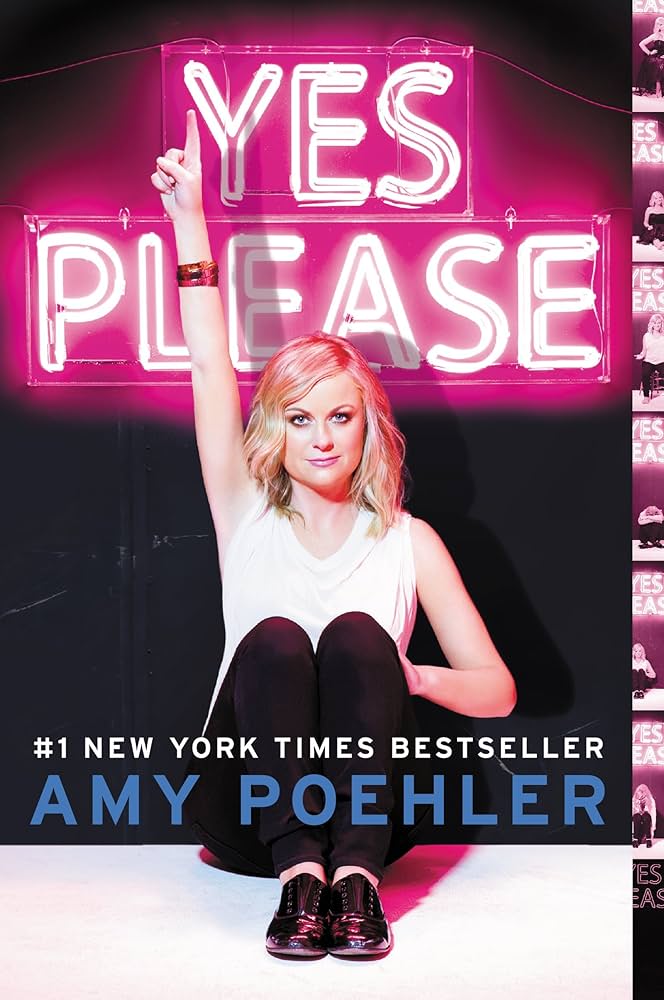
NM: Yeah, me too. It’s the best.
AA: Yeah, she’s awesome. Okay, I have some more questions about Studio C and JK! Studios. Because my kids were absolutely obsessed with Studio C, and we are such big fans in our family. We think it’s the best, and I wanted to see if you’ll give us a glimpse behind the curtain about the writing process and working together on Studio C, again, with the caveat that all those people in that room are really, really good people. So establishing that at the outset, did you notice any gender dynamics being a woman and kind of figuring things out together?
NM: Like I mentioned, we really became a unit during our college years, and that was when we were grinding. We put out a new show every month, we were responsible for the marketing, the writing, everything. And we would rehearse and rehearse and work and work and work. So we definitely found our own internal language together as a creative group, and I’m really, really grateful for it. But with Studio C, we were three women, seven men, only two people of color and they’re both men as well. So, not the most diverse group. But again, we’re a comedy group from BYU and that’s just kind of the way it happened. The basic writing process for us, and honestly, kind of still is, we can talk about how we wrote Go West as well in a minute. But back in the day, it kind of became a sketch machine. It was really crazy. Each season was a couple hundred sketches that we would write together. And to put that into perspective, it was the ten of us writing and we were also the actors. And at SNL, there’s usually a writing team of between 15 and 20 just writers, and a good season for a writer is that you get two or three sketches on.
AA: Wow.
NM: Right? So, so many sketches. We were just cranking them out. It was a ton of work. Six months of the year was writing, and then the other six months would be the filming, that was kind of how it went. And for gender dynamics, I remember that there was a sketch, and I wish I could remember it better, where basically it’s a boyfriend and a girlfriend and the boyfriend’s talking to his guy friends and he’s like, “I think my girlfriend’s a werewolf,” and it was actually that she had just gotten her period. It was kind of implied and he just doesn’t get it. And I remember that we kept it as PG as possible, but by just implying that a woman has something that happens to her every month was like, we couldn’t do it.
AA: Oh, really?
NM: Yes. And I do remember leaving that writer’s room and talking to Mallory and Whitney and being like, “This is crazy.” It’s so strange that we can’t even talk about it, because it’s not like we even choose it, right? It happens to half of the world’s population every month. Can we not acknowledge it?
AA: Who said you couldn’t? Did you just know that BYU wouldn’t approve it, or what was the deal?
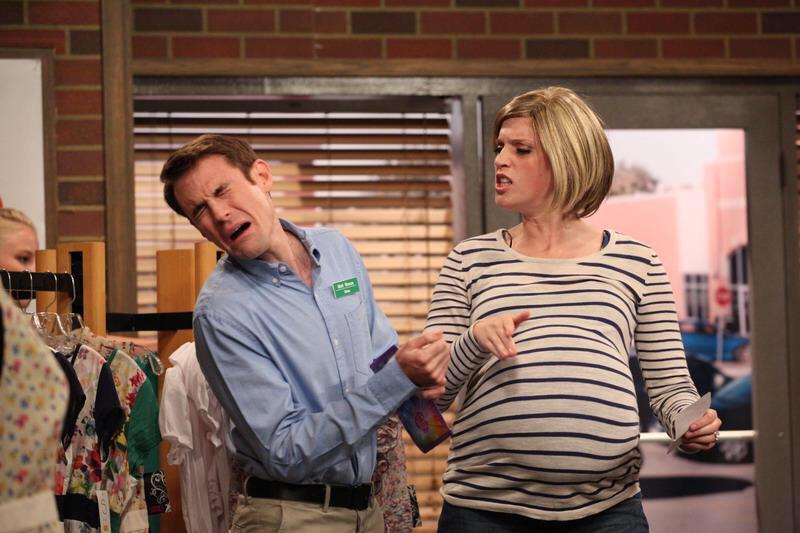
NM: I think a few of the decision-makers were like, “Yeah, I don’t think this is worth the fight within this network.” And granted, maybe the jokes just weren’t strong enough, but I do remember being pretty shut down just because we mentioned that. Or mentioning, like, a bra. We couldn’t mention a bra. And especially earlier, I remember that I would try to pitch kind of parent content, like, “Hey, having a newborn is exhausting and hilarious, and this is my experience and I want to write about it” and it just didn’t go over well. And again, that could be that it wasn’t a solid script, or it could be that no one else in the room had kids or had this female experience of having a baby and how that changes your body and your mind and all that stuff.
So, like you mentioned, I’m so close to these people even now, my kids call them all aunt and uncle, I see them all the time. They hear me, they’re very supportive of me, but especially within that network organization there is still an extra layer of “We can’t do that, we can’t say that.” Which is really understandable, knowing how that network works and where all the funding comes from and stuff. Absolutely, it makes a lot of sense. You have to keep on with those standards, which I really understand. But I do remember a few times being like, “We can’t even acknowledge this inherent natural thing a woman does?” I remember leaving and being like, “Man, I just don’t understand.” You know what I mean? Like, do they know that we don’t choose when our cycle comes? Is this just a disconnect or is this clearly inappropriate? But even now, my kids were watching a cartoon yesterday and one of the B storylines is that one of the girls was getting her period. They were talking about it and my son was watching it, we were all watching it, and there were zero red flags. And nobody was like, “Ew!” Because I had already talked to them, my son had already been through the maturation program. He’s like, “Yeah, that happens with girls.” And it wasn’t even a big deal. I was like, “Oh, this is great!” So even little changes like that, I’m really grateful for.
AA: This episode is turning out to be so heartening, Natalie, because I see all of these positive changes in how things were when I was a kid and how totally stigmatized menstruation was. And it sounds like it still was in your experience, but that is changing too.
NM: Yeah, I mean, that was probably eight or nine years ago now. But honestly, I don’t know if it would be that different even now. It’s also an interesting debate about what is family friendly. Because honestly, it’s kind of up to families to decide what’s friendly for their family, right? In my house, if we’re watching a cartoon and one of the characters is getting her period and she doesn’t know what to do, what a great opportunity to talk to my kids about what this is. But there are other families that would be offended and say, “I can’t believe they would talk about that. That’s not family friendly.” Well, how do you think you get your family in the first place? That’s my opinion. So, living in this world of family-friendly content and comedy, you do have to follow an internal compass, a gut check of like, do you know your audience? Do you think they’d be okay with this? And a lot of times it’s up to us. We always said on Studio C that we just wrote what we thought was funny, and the fact that other people thought it was funny was a wonderful bonus. We just wanted to make what we felt excited to make, and the fact that other people agreed with us was great.
AA: Well, that’s a perfect segue into our next topic, which is your movie, Go West. It was such a great movie, I loved it!
NM: Oh, you’re so nice to see it. It was so fun to have it out, and hopefully by the time this is out, it should be available to buy.
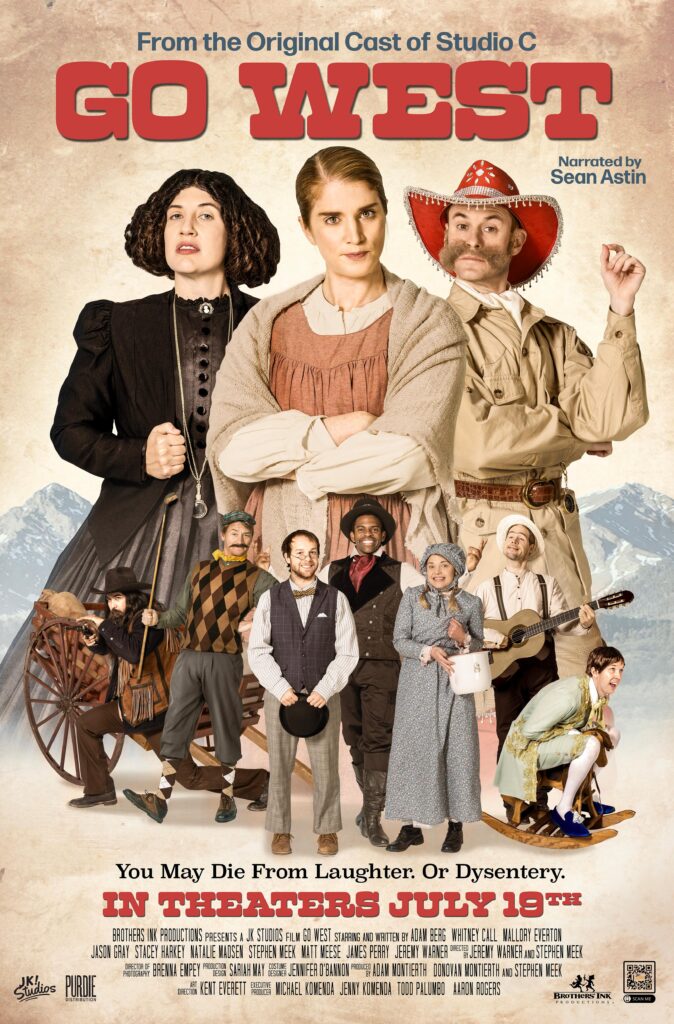
AA: Yes, I highly recommend it. It’s such a great family movie, so great for kids. And when I watched it, I noticed as I was watching that there were some really strong female characters and some hilarious commentary on gender. But backing up, I’d love to hear the story of the writing of it. How did that go?
NM: Yeah, great. So, Go West was one of those things where we’re still really close and we have kids and side jobs and we’re all doing our own thing, but we love to get together as much as we can to make something together. And this time we met some producers who said, “Hey, if you can make a really cheap script, we can fund a movie.” And we were like, “Wow, amazing. We would love to make a movie.” And we thought, what can we do cheap and fast in Utah? And we realized that there are pioneer houses everywhere, so let’s do a pioneer movie. That was the thought process. And all of us love, love, love Monty Python, grew up on Monty Python and the Holy Grail. So in my mind, the fastest way we can write a movie is if we just write 30 sketches about pioneers, and we figure out a way to tie it together very loosely with the plot. Because Monty Python and the Holy Grail is technically about King Arthur trying to get the Holy Grail, but then there’s a witch trial and a troll bridge, and who cares about the Holy Grail by the end, right? It’s mainly about these funny moments. It’s just a very, very silly movie.
So I came to the group and said, “Hey, let’s meet once a week and bring scripts and see if we can do this thing,” and that’s kind of what happened. It was a very, very collaborative effort. All ten of us would bring scripts and characters and ideas until we got a list of about thirty scenes where we thought they were all pretty fun. Anyway, by the time we had thirty sketches, me and Mallory and Whitney got together over a weekend. We just hunkered down in an Airbnb and we said, “Okay, how do we thread all this together?” And you’ve seen it. There is a plot, there’s stuff going on, but it’s so thin, it’s just to get us to the next place. We decided that there should be a map and a narrator, and the very, very basic story is that there are two sisters and one of them is insanely sick. Like really, really grossly sick with dysentery. There’s kind of a love triangle with this guy, and also the straight woman has this curse she’s trying to debunk. And that’s kind of how it happened. And we kind of wrote it out.
The character of Robert, which is Whitney’s character, is the best. Every day that I saw her on set and I got to do a scene with that character, I was like, “This is the funniest thing. This is just going to be the best.” I’m sorry if the listeners haven’t seen this and don’t know what I’m talking about, but essentially the character of Robert is a woman. That’s one of the jokes. Her father named her Robert because he was in denial that he didn’t have a son, but you know, she’s very stern, very rigid, and tries to have a lot of masculine energy. Oh my gosh. I love, love, love her character. And that was all Whitney. That was Whitney’s brainchild and just so, so good. So yeah, when I first met you, we were talking about Go West and you said that there were so many strong female characters. And I was like, “Yeah, I guess there are.” I don’t think we ever sat down and said, “Let’s make a super strong feminist story.” We just wanted interesting characters to play for ourselves, so that’s kind of how we got there.
AA: I agree. Every time Robert came onto screen I was dying laughing. Can you tell us some of your favorite moments or even favorite lines, if you have them, from Robert?
NM: Yes. I remember that during these writing meetings, as we were writing the movie, Whitney brought the first scene where we meet Robert and that first line where she says, “My father was ashamed I was a girl, understandably.” So immediately you’re like, “Oh my gosh, this is a great character.” You understand her. Like, “I am a misogynistic woman. Women are less, and I understand this more than anyone because I am a woman.” So funny. And it just kept on getting funnier from there. But that scene we filmed was the first day of filming the whole movie, that was our first scene. And she had an extremely specific picture that she wanted Robert to look like. It was an actual picture of a pioneer woman, she had those ringlets and it poofed out, and it was so specific. When she pitched that character, she had that picture and she was like, “It will look like this.” So when we got to set and she really looked like that picture, it was so fun. It was so fun to see her come to life. Yeah, some of my favorite Robert lines, oh, this was so good: “My father taught me all the male arts of fighting, negotiating, and expecting others to adjust to my comfort level.” And then everyone goes like, “Yeah, that is a male skill.”
AA: That was maybe one of my favorites.
I don’t think we ever sat down and said, “Let’s make a super strong feminist story.” We just wanted interesting characters
NM: It’s so good. Another one of our brilliant cast members, Adam, had this character who just burned his tongue on some soup and he’s a really helpless man in the world. He is the opposite of Whitney’s character, not savvy. After Whitney had pitched this Robert character and Adam had pitched his character in there, we loved them both so much. Whitney came the next week with the scene where they meet and we were like, “Oh my gosh, here we go.” Because they’re so different from each other. One of my favorite lines is when Robert, Whitney’s character, comes and Adam’s character is talking about how women were mean to him, in particular my character and Mallory’s character, we were there like, “This dude isn’t going to survive, this guy’s an idiot” and then we leave. And she just looks at him and says, “Women belittled you?” She can’t believe what she’s seen, like, “But you’re a man. Even though you’re a very pathetic man, you’re still better than me.” And I love how she says “women belittled you” and she basically just says that you’re a man and that’s the only qualification you need for success. It’s funny because, like all good jokes, it was true at the time. In that time period, she wasn’t wrong, right? All you needed to be was a white man and you had land and rights and all sorts of stuff. So, so funny. I loved that character.
AA: It was so great.
NM: That was all Whitney Call. Whitney Call is a genius.
AA: It was fantastic. A couple of my favorite lines from her were: “If women were meant to make more money, they’d have bigger hands.” She would just throw these lines in.
NM: They’re so good!
AA: And I loved your line, too, your character, Aveline, when there’s a song about “I believe–” and you’re supposed to say something that you wish for. And first, they’re really lighthearted and the normal things that you would say I wish for, and then you’re like, “Honestly, I’d love to vote.”
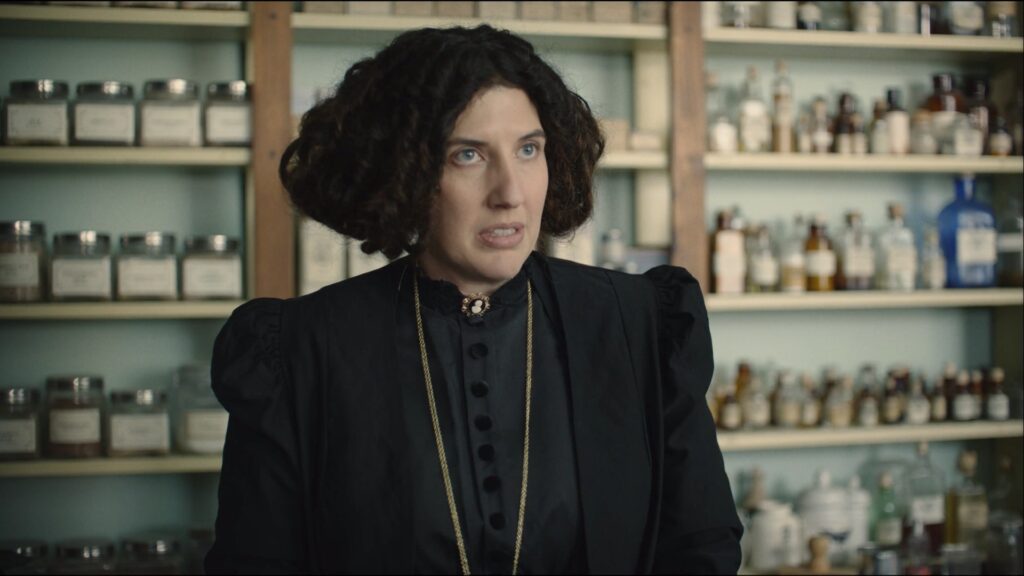
NM: And Stacey flips out his guitar like, “Well, it is the 1800s.” Stacey Harkey wrote that joke, because Stacey Harkey wrote that song and it was an amazing joke.
AA: That was such a great joke and such a great scene. I loved that.
NM: Again, it’s funny because it’s true.
AA: It’s funny because it’s true.
NM: Anyway, it was such a fun writing experience. It was six weeks that we wrote it in, which is really, really fast.
AA: That’s so fast! I cannot even imagine.
NM: We wrote it really, really fast. We were just having so much fun. I feel like we’ve had experiences in the past where we’re dragging our feet trying to write and it takes us months and months. And this was so like, “We get the concept, let’s do it!” So that was really fun and really encouraging.
AA: I love it. So great. We’re almost to the end of our episode, Natalie, but is there anything else that you want to say?
NM: I don’t think so. It’s just been so fun to chat through things. I feel like you just kind of live your life and you have your experiences and you’re not always necessarily looking at it through this feminist or even internal patriarchy lens, right? You make all these choices and you do all these things in your life and some things are so fun, and then some things are so hard, and you’re a part of these systems all the time. So to be able to sit and think back on like, “Oh yeah, it was harder to pitch jokes about my life because I was a minority in a room and it just wasn’t as relatable to all these men, and men make the decisions.” I feel like we all, as women, go through life adapting to these systems because that’s the system we’re in. So to be able to really sit and reflect and think about how it’s changed or how we want it to change for the future and for our kids when they’re having these adult experiences, I think it’s so valuable and so important. So, I’m really happy to chat and see you.
AA: Thanks again, Natalie, for being here. I loved your movie and love your work. Again, listeners, check out the movie Go West, which is streaming now.
like all good jokes
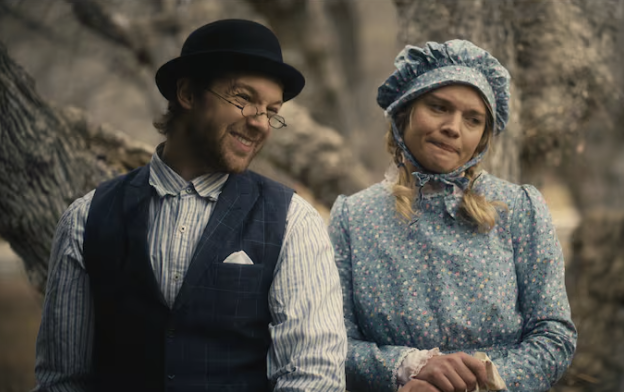
it was true at the time
Listen to the Episode
&
Share your Comments with us below!

